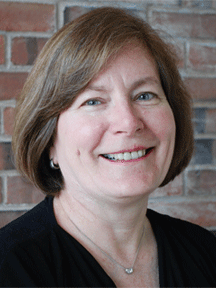By Jennifer M. Tharp
On August 3 at the 43rd Triennial Council, the Phi Beta Kappa Society elected Catherine White Berheide to serve as Vice President of the national organization. Berheide was elected to membership in Phi Beta Kappa by the chapter at Beloit College in 1972, where her mother, Phyllis Cox White, and grandmother, Jeannette Wade Cox, were also elected to membership. A professor of sociology at Skidmore College, Berheide provides a wealth of experience in her work with Phi Beta Kappa and in her discipline. In an interview with Berheide, she provided an eloquent discussion about the future of Phi Beta Kappa, the improvement of undergraduate education, and the need to create more opportunities for women.
Berheide first became involved with Phi Beta Kappa governance in 1993 when the Committee on Qualifications invited her to serve as one of its social scientists. Respected in the field, she had recently finished her second term as Chair of Skidmore’s Department of Sociology, Anthropology, and Social Work as well as received a Congressional Fellowship from the American Sociological Association. Her work with the committee involves evaluating the applications to determine if undergraduate institutions are qualified to receive a charter for a Phi Beta Kappa chapter based on the breadth of liberal arts and sciences offered to all students. “Even the applicants we turn down take very seriously the issues we raise about the quality of their liberal arts programs. They often set to work on improving,” noted Berheide. This focus on improving the quality of undergraduate education is part of Berheide’s vision for Phi Beta Kappa.
Part of the Society’s future role will be as a defender of the liberal arts and sciences and their necessity to our democratic society. During the current economic downturn, there have been increasing attacks on the value of a major in the liberal arts and sciences. Instead, Berheide commented, applied studies such as engineering and pharmacy are advocated. Although these majors serve important functions, she added, “somebody has to major in physics, in sociology, and in English, for example, if we are going to be able to continue as the kind of creative and innovative society that we have been.” Among other important benefits, the liberal arts and sciences provide the writing, quantitative, and critical thinking skills to allow students to analyze the nation’s problems. The second part of her vision involves increasing the reach of the Society to newly elected student members, faculty across the country, and members currently working in the private and public sectors.
Beyond her work for Phi Beta Kappa, Berheide has done extensive research on women’s employment, ranging from women with PhD’s to women in the lowest paying sectors of the job market. She entered graduate school in the 1970s, when the landscape of women’s employment was rapidly changing, and she began asking questions about women’s role in the workforce. In addition to women facing the glass ceiling, Berheide researched those who are nowhere near the ceiling. She coined this the “sticky floor” to describe the jobs of many women at the bottom of a company or government agency who have no path to advancement. “There is no place to move, and that has serious consequences for them and for their children. When women are stuck and cannot get a job that earns enough to support their children, then that has long-term consequences for society,” said Berheide. She hopes to see a future where both men and women can advance in organizations, earn a living wage, and be able to support a family without having to choose between career and children. Her current research on this subject, supported by a grant from the National Science Foundation, focuses on increasing the number of female faculty in STEM fields particularly through improving their work-life balance.
In addition to her significant research contributions, she has also taken the time to work towards the improvement of undergraduate education. At Skidmore College, she has served as both the Chair of the Sociology, Anthropology, and Social Work Department and the Director of Women’s Studies. While teaching at the college, she worked work with the American Sociological Association to refine the sociology curriculum. One of her publications highlighted the usefulness of a capstone course to enable student to use all of their cumulative skills on a project that could be presented to future employers. Due to her contributions, the Carnegie Foundation twice selected her as a Carnegie Scholar and the American Sociological Association Section on Teaching and Learning gave her the Hans O. Mauksch Award for distinguished contributions to undergraduate sociology. In the classroom, Berheide teaches several courses including Women in Modern Society, Women in the Global Economy, and the Senior Seminar in Sociology. “This scholarship on undergraduate education,” she noted, “has prepared me more to take on a role in Phi Beta Kappa than my research in the sociology of work. I have been studying the question of how we can improve the quality of education for close to thirty years now.”
Her experience in working with Phi Beta Kappa, her extensive research, and her passion for undergraduate education ensure a bright future in Berheide’s role as the new Vice President of the Society. Her vision will increase the involvement of members in the society’s activities and further the society’s support of a broad education including the liberal arts and sciences.
Jennifer M. Tharp is a senior at Carnegie Mellon University majoring in ethics history and public policy. Carnegie Mellon is home to the Upsilon of Pennsylvania chapter of Phi Beta Kappa.




